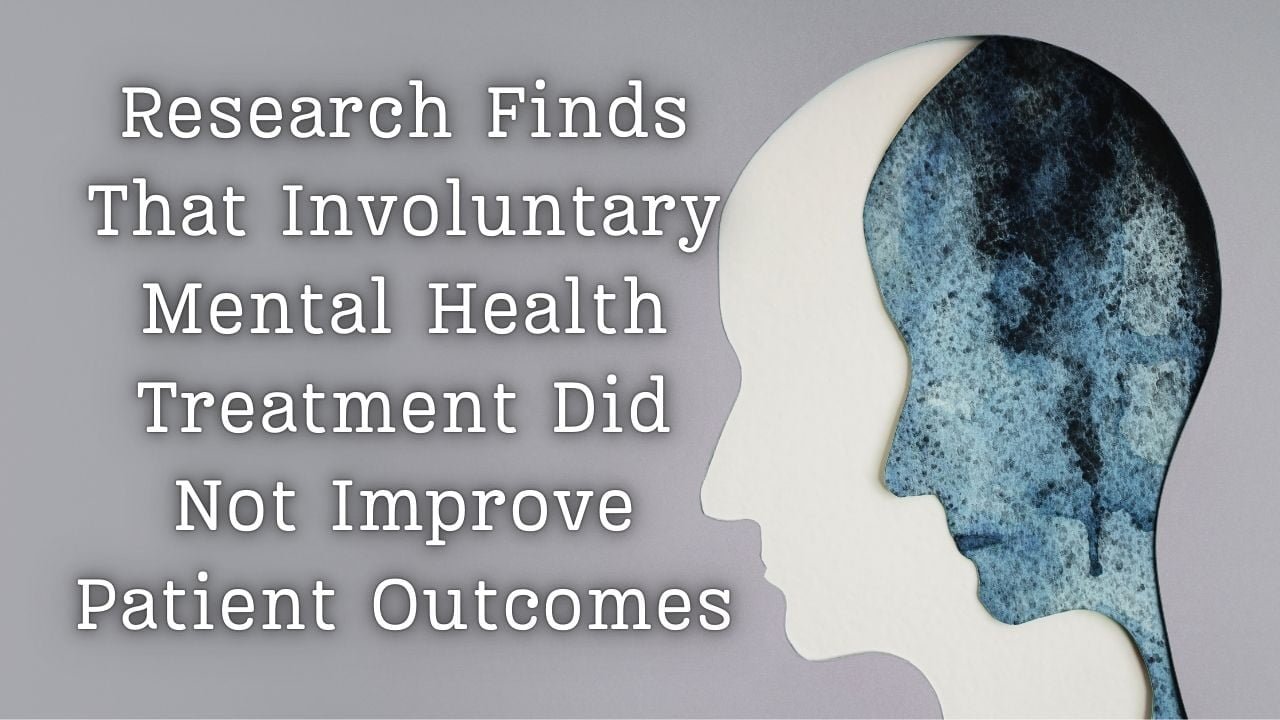Involuntary mental health treatment has significant evidence of harm, but there is no established benefit, according to the World Health Organization.
Involuntary Mental Health Treatment
The goal of laws that, under certain conditions, allow involuntary commitment or treatment at a psychiatric facility is to stop mentally ill people from getting worse or hurting themselves or others. However, forced mental health treatment has not been shown to be beneficial to psychiatric patients in any way. Patients did not benefit from nonconsensual mental health treatment in terms of improved mental health or decreased mortality, according to a new study.

In order to compare outcomes for adult patients with severe mental disorders who either received involuntary treatment at community mental health centers or did not, researchers in Norway looked at the country’s national health data from 2014 to 2018. In the designated service areas, the centers either had relatively higher or lower rates of involuntary commitments.
The study, which was published in BMC Psychiatry, sought to determine whether areas with lower rates of involuntary mental health treatment had worse outcomes for patients with severe mental disorders. The researchers hypothesized that patients in areas with lower levels of involuntary treatment would have worsening mental health conditions and higher rates of suicide and death over time if coerced treatment were beneficial. The researchers did not find those outcomes.
Study Findings
The study’s lead author, Olaf Nyttingnes, Ph.D., of the wellbeing administrations research unit at Akershus College Clinic in Norway, estimated that regions with lower utilization of compulsory consideration would show less fortunate results than areas of higher use. This effect was not found by us.
There was no statistically significant difference found between patients with severe mental disorders who received forced mental health treatment and those who did not, as the researchers tested for five potential adverse outcomes. Patients who lived in areas with lower rates of involuntary treatment did not have higher rates of suicide or any-cause mortality, higher rates of inpatient care, or shorter periods of time before an episode of involuntary care. Additionally, the number of patients with severe mental disorders in those areas did not increase over time.
Nyttingnes came to the conclusion that they did not observe significantly more case fatalities, deterioration into involuntary care, or an increase in the number of inpatient days for patients with SMDs (severe mental disorders), nor did they observe significant increases in the number of suicides or rates of SMDs at the area level.

World Health Organization (WHO)
Due in part to the lack of research demonstrating any benefit to patients, the World Health Organization (WHO) has taken a strong stance against involuntary mental health treatment. The World Health Organization (WHO) stated in a series of guidelines published in 2021 that coercive mental health practices are utilized despite the substantial evidence that they cause physical and psychological harm as well as death.
The World Health Organization (WHO) advised member nations of the United Nations, including the United States, to take bold measures to ensure that their mental health services are free of coercion, which could include electroshock without consent, forced drugging, the use of physical and chemical restraints and seclusion, and involuntary institutionalization.
Acute mental distress is included in WHO’s call for an end to involuntary mental health treatment. Individuals in mental health crisis “are at a heightened risk of their human rights being violated, including through forced admissions and treatment,” according to the guidelines. People’s mental, emotional, and physical health have all been shown to suffer as a result of these practices, which occasionally result in death.
Citizens Commission on Human Rights (CCHR)

The Citizens Commission on Human Rights (CCHR) has long advocated to end involuntary treatment and harmful psychiatric practices, restore human rights to the mental health field, and reject nonconsensual mental health treatment.
People who are subjected to coercive practices report feeling dehumanized, disempowered, and disrespected, according to WHO guidelines. Many people see it as a form of trauma or re-traumatization that makes their condition worse and makes them feel more upset.
The WHO guidelines present a vision of holistic mental health services, as opposed to the current mental health approach, which places a narrow emphasis on diagnosing and medicating individuals to suppress symptoms, which leads to “an over-diagnosis of human distress and over-reliance on psychotropic drugs.”
The Citizens Commission on Human Rights has exposed and campaigned against the abusive use of involuntary institutionalization and psychiatric treatments administered without consent, such as forced drugging, restraints, and involuntary electroshock, as a human rights organization and watchdog of the mental health industry. The rights we believe each person should have in the mental health system are listed in the Mental Health Declaration of Human Rights prepared by the CCHR.
Psychiatric Abuse
Members of the Church of Scientology and Dr. Szasz co-founded the Citizens Commission on Human Rights in 1969 to end abuses and restore human rights and dignity to mental health. 228 laws worldwide against psychiatric abuse and human rights violations were made possible thanks to the CCHR.
The CCHR Public Issues Office in Washington, DC, has upheld for emotional wellness privileges and assurances at the state and government level. Over 800,000 people have been educated on the history and current state of racist and abusive psychiatric practices by the CCHR traveling exhibit, which has been displayed at the Congressional Black Caucus Foundation Annual Legislative Conference in Washington, DC, as well as other locations.
Find more now:
Related
Related posts
Categories
- Accident Lawyers (19)
- Adventure (1)
- Art (7)
- Author (24)
- Books (34)
- Business (32)
- Celebrity News (8)
- Debt (6)
- Design (3)
- Economy (11)
- Educational info (74)
- Events (11)
- Fashion (7)
- Filmmakers (8)
- Food (29)
- Gaming (10)
- Guide (7)
- Health & Beauty (43)
- Home (41)
- Insurance (8)
- Interior (1)
- Life (1)
- Lifestyle (5)
- Loans (11)
- Mortgage Loans (5)
- Motivation (4)
- Music (10)
- Parenting (1)
- People (3)
- Pets (5)
- Photography (4)
- Podcasts (5)
- Politics (2)
- Products (23)
- Relationships (3)
- Review (1)
- Scholarship (15)
- Student Loan (3)
- Style (1)
- Tax Lawyer (3)
- Tech (58)
- Travel (30)
- TV And Film (2)
- Uncategorised (8)
- Uncategorized (9)
Subscribe Now
* You will receive the latest news and updates on your favorite celebrities!





Social Media